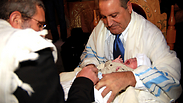The figure points to an 18% drop in botched circumcisions from the previous year, which recorded 38 such cases.
According to reporters received by the committee, 24 of the babies taken to hospitals in 2013 suffered from excessive bleeding as a result of the foreskin removal, and one suffered from an infection. This year there were no cases of damage to the penis or urinary retention – as opposed to two cases recorded in 2012.
Most of the infants mentioned in the report were hospitalized for one day following the complication, while two were hospitalized for three days – a total of 19 hospitalization days in 2013. Two babies were operated on, two required stitches and 15 only received conservative treatment. Seven babies were discharged without hospitalization, including three who did not require any treatment at all.
In 2012, the total number of hospitalization days was 51, and two infants were hospitalized for two weeks. Eighteen received conservative treatment, seven required stitches and two underwent surgery. Four were discharged without any treatment.
Matter of experience
In 13 out of the 23 complications, the mohel was a person certified by the Chief Rabbinate to perform circumcisions. A similar ratio between the number of certified and uncertified mohelim was recorded in 2012. The report does not include circumcisions performed by doctors.
Dr. Moshe Westreich, a member of the inter-ministerial committee for supervising mohelim, told Ynet that up to three years ago an average of 50 to 60 circumcised babies were evacuated to hospitals every year, and that since then there has been a constant decrease in their number – reaching 31 in 2013.
He stressed, however, that in most of the mentioned cases the complications were not significant, but rather common problems which do not require evacuation to hospital or special treatment – as shown in the report. Many of the cases took place on Shabbat or in the periphery, where not many mohelim are available, and the babies were taken to hospital to be on the safe side.
Westreich added that the drop in the number of reports began after the committee started demanding that mohelim answer all of the parents' questions even on Shabbat and guide them on how to deal with any possible problem with the baby. This indicates, he said, that in most cases the evacuation to hospital was unjustified.
Although botched circumcisions can sometimes result in real damage to the penis or serious bleeding, the committee member noted that unfortunate accidents can also happen to senior and experienced mohelim and doctors, and therefore do not necessarily serve as grounds for revoking a person's license to perform circumcisions.
The last time such a sanction was imposed for a medical complication was about 15 years ago. Today the committee usually deals with such cases through training and advanced studies for mohelim, as it appears to be a matter of experience rather than negligence or lack of knowledge.
'Tight supervision'
In general, the committee has rarely disqualified certified mohelim in the past few years. In few cases it does due to the use of halachically-forbidden devices or different ethical offenses – for example, on charging money for the service.
Dr. Westreich finds it difficult to believe that there are other serious medical cases which have not been treated or reported in the acceptable ways, as part of an attempt to cover up botched circumcisions. It's unthinkable, he said, that parents of a week-old baby in moderate or serious condition would not go to the hospital in a bid to defend the mohel.
He noted that medical institutions are required by the Health Ministry to submit to the committee a detailed report on every such mishap, which they are not required to do in other cases. "Even surgeons don't have to report every complication," he said. "There is tight supervision over mohelim."
Parents urged to use certified mohel
But the law does not ban uncertified mohelim from performing circumcisions, therefore the efficiency of the inter-ministerial committee is limited. It is only authorized to revoke the licenses of circumcisers who have sinned, but even they can continue working without a license.
"All we can do is call on parents to use a certified mohel," says Westreich. "Nothing more."
After analyzing the data, the Rabbinate noted satisfactory results: An average of less than one complication per 2,000 circumcisions out of 65,000 performed every year. In addition, 57% of the complications were caused by certified mohelim, who perform about 70% of circumcisions.
According to Rabbi Moshe Marciano, director of the Circumcision Department of the Chief Rabbinate, "The figures prove to all slanderers that circumcision is a safe and secure act, and anyone pretending to oppose the brith milah mitzvah, allegedly due to the danger it poses to the circumcised, is not telling the truth. The circumcision complication rate is minimal even compared to medical procedures.
"Yet it's important to remember that circumcision is not a medical procedure, but a religious act. A father who chooses to circumcise his son is retroactively accepting his own circumcision, and the amazing figures show that about 98% of Jews choose through the circumcision to belong and to affiliate their children with the Jewish people, despite the involved action."
Marciano added that the figures "come as a response to different elements in the world who are seeking to damage the pact between the Jewish people and God Almighty."
According to the rabbi, anyone trying "to sentence circumcision" in Europe recently, as has been done throughout the history of the Jewish people, is not doing so in the name of progress but out of hatred towards others.

















